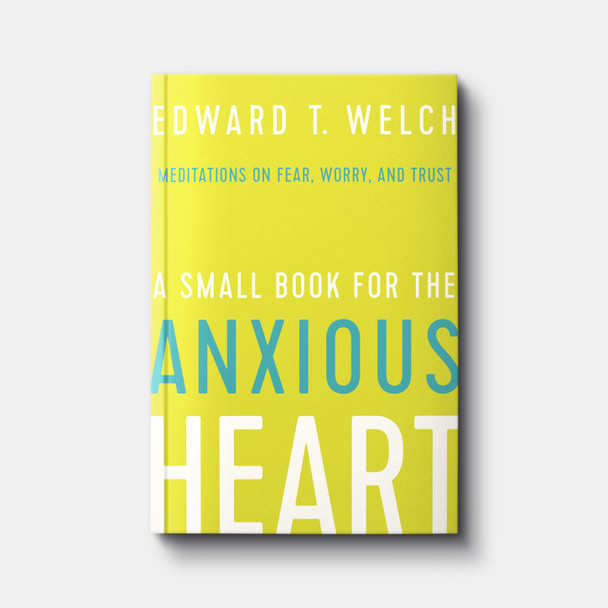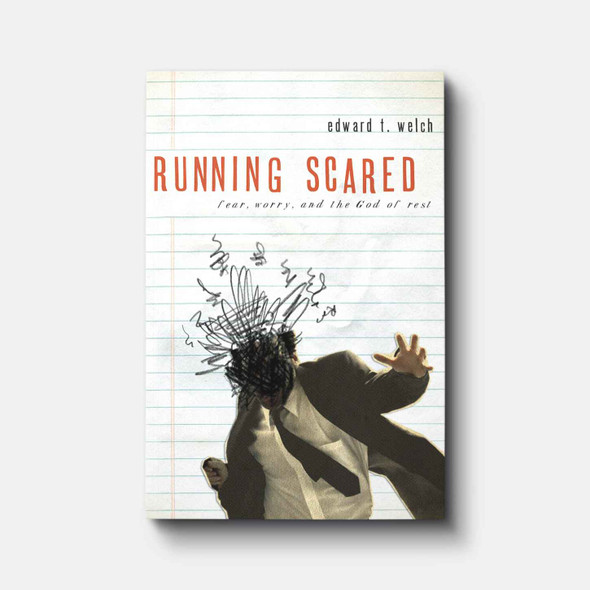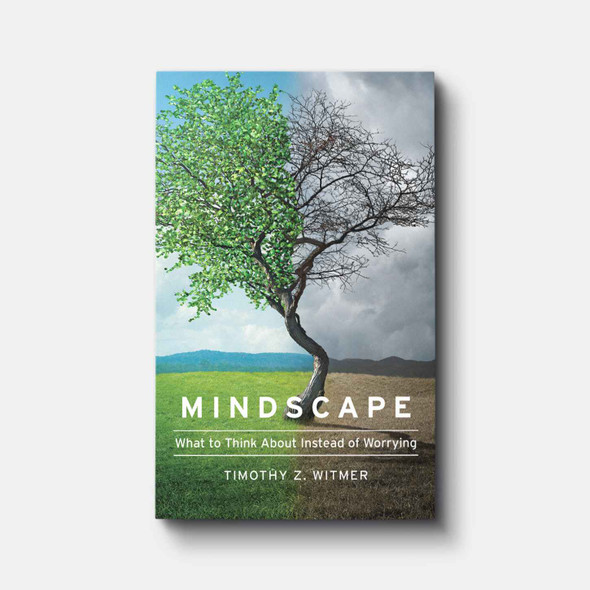A Small Book for the Anxious Heart: Meditations on Fear, Worry, and Trust
- MPN:
- 9781645070368
Videos
Hide Videos
Show Videos
Description
Fear and anxiety are chronic struggles for many people that are only intensifying and increasing. Best-selling author Edward T. Welch shares the comfort and peace of Jesus in fifty brief readings for those who wrestle with fear.
A Small Book for the Anxious Heart is a small but powerful devotional to remind men and women of the encouraging, beautiful words in Scripture to anxious people.
While many books on fear and anxiety exist—promising to help men and women manage their struggles with methods and formulas—this devotional reaches deeper into Scripture, making the Word of God more accessible. Don't put a Band-Aid on your fear and anxiety; rather, learn to bring your fear to Jesus, relying on his Word.
Welch has been counseling for over thirty-eight years and is the author of more than a dozen books, including A Small Book about a Big Problem, Running Scared: Fear, Worry and the God of Rest, Shame Interrupted, When People Are Big and God Is Small, and many others.
Jesus cares for us, and in these readings, Welch invites readers to trust him for today, knowing he goes before us always.
Edward T. Welch, MDiv, PhD, is a licensed psychologist and faculty member at the Christian Counseling & Educational Foundation (CCEF). Ed has been counseling for over forty-five years and has written extensively on the topics of depression, fear, and addictions. His biblical counseling books include Shame Interrupted, When People Are Big and God Is Small, Addictions: A Banquet in the Grave, Depression: Looking Up from the Stubborn Darkness, Running Scared: Fear, Worry, and the God of Rest, Caring for One Another, A Small Book about a Big Problem, A Small Book for the Anxious Heart, A Small Book about Why We Hide, I Have a Psychiatric Diagnosis, Someone I Know Is Grieving, Fear Is Not a Sin, The Humility Project for Men, and The Humility Project for Men Study Guide.
Endorsements
"For those of us who often find ourselves simmering in anxious thoughts, we need something more than being told not to worry. We need something else, something better, to fill and shape our thoughts and feelings. Each short entry in this little book provides a dose of Scriptural truth to keep nudging us toward peace and rest in Christ."
Nancy Guthrie, Author and Bible teacher
"Packed into A Small Book for the Anxious Heart is deep wisdom to help us with a persistent misery—the anxiety that robs us of freedom. And here is why I respect the counsel Ed Welch offers. It isn't about handy tips for our own crisis management, but the moment-by-moment nearness of the Lord himself."
Ray Ortlund, Pastor, Immanuel Church, Nashville, TN
"Anxiety is a deep struggle that is rarely removed in one fell swoop. Instead, it requires a steady flow of Scripture to quell its tendency to consume our lives. A Small Book for the Anxious Heart provides readers with a sustaining stream of hope from the Bible."
Curtis Solomon, Executive Director, Biblical Counseling Coalition
"When anxious, we need gallons of biblical wisdom for our muddled thoughts. But we are exhausted and can muster little emotional energy for books deep enough to help. Ed offers page-and-a-half chapters, thimblefuls of truth we can manage that soothe and steady."
Steve Estes, Pastor, Brick Lane Community Church; coauthor of When God Weeps
"Anxiety, hassle, worry, stress, and bouts of panic are all rogues that harass us as we roam this broken world. Ed Welch gets the problem and knows we need fresh faith for each day's burdens. A Small Book for the Anxious Heart is offered as an essential weapon in the fight for faith, peace, and joy."
Dave Harvey, Pastor; blogger; teacher; author of I Still Do! Growing Closer and Stronger through Life's Defining Moments
"In fifty days of meditations, Dr. Welch pens short, pointed, and crystalline reflections that take hearts captive to fear and frees them to faith in Christ."
Alfred Poirier, Visiting professor at Westminster Theological Seminary; author of The Peacemaking Pastor
"With clear, intimate writing, this small book addresses burdens carried by so many of us. On each page, truth and love are blended so that real life is the arena and the real God is the center. If we anxious ones will open its pages, we will again find God drawing wondrously near to us."
Andrew Nicholls, Director of Pastoral Care, Oak Hill College, London; coauthor of Real Change: Becoming More Like Jesus in Everyday Life
"If you struggle with worry and fear, digest these bite-size chunks each day for fifty days, and I promise that your love for Christ will grow. Ed Welch's A Small Book for the Anxious Heart is a goldmine of biblical truths for the worried soul."
Deepak Reju, Pastor of Biblical Counseling and Family Ministry, Capitol Hill Baptist Church, Washington, DC; author of On Guard and She's Got the Wrong Guy
"Popular anxiety treatments are generally designed for the isolated individual. Ed refuses to concede isolation as the given, and helps us find God and others nearby when we are afraid. So we get to join him in finding today's manna, living in today rather than tomorrow, and finding refuge from all that is so understandably scary."
Michael Gembola, Executive Director, Blue Ridge Christian Counseling
"This is exactly what my anxious heart needed: briefly explained, surgically precise, and accurately applied Scripture to the very site of each metastasis and malignant cause of anxiety, fear, and worry within me. Repentance and renewed faith flourished within me as I savored every line of this welcome tool of grace."
Joseph Vincent Novenson, Pastor, Lookout Mountain Presbyterian Church, TN
MIX, MATCH & SAVE
Apply coupon code MIXNSAVE to your shopping cart
- Buy any 10 - 24 products and save 25% off retail price
- Buy any 25 - 49 products and save 30% off retail price
- Buy any 50 - 99 products and save 35% off retail price
- Buy any 100 or more products and save 40% off retail price
*Some exceptions apply
42 Reviews
-
Great book
Great book for a good price!
-
Great book in bad condition
This is a very helpful book, but it arrived with a sticker partially pulled off the cover. The entire cover is sticky with sticker residue which is impossible to remove. How could anyone not have noticed this somewhere in the packing/shipping process!
-
Great book
This book is fantastic, Ed is a great writer and down to earth and definitely knows his creator.
-
A non-overwhelming book
This is a small book of meditations on fear, worry, and trust. I never thought I was someone who struggled with anxiety. Short story: I was wrong. When I do feel anxious, God has shown me (through my loving wife) that I wasn’t trusting him with our future and finances. This book by long-time (30+ years!) biblical counselor Ed Welch gives you 50 days of devotionals, each being only a few pages long. Welch writes that “our lives are full of uncertainties” (3). We never know what will happen tomorrow. Because of that, stress and fear easily slide (or barge) in. He wrote his book “to help us become more skillful in how we identify our fears and anxieties, hear God’s good words, and grow” (3). Wisdom, “skill in living,” is his goal (3). He defines fear, anxiety, panic attacks, and stress so that he and the reader are on the same page. Fear is “loud and visceral,” but anxiety is often harder to pin down. We care about things in this world, and because we can’t control very much, the thought of things not going our way worries us. The problem is that “our worries tend to imagine a future without God in it” (19). One way we show trust in God is through sharing what is on our heart with him. We trust that he will listen, that he cares, and that he won’t mock us for our fears. We trust his covenant faithfulness to us. Welch ends each day with questions. Good biblical counselors ask good questions, and Welch has been a counselor long enough that he knows how to ask good, simple questions. Recommended? In a way, this is a short book. Yet when I missed a few days and would try to catch up, it wasn’t quick reading! The chapters are simple, yet there is a lot to think about, especially if you are struggling with anxiety. You won’t get all of your problems solved in one day. Rather wisdom-living is something borne out of hard labor over a long period of time. As Welch notes, a long time is not something an anxious person wants to hear. But God is with you, walking by your side, caring for you. You can trust him.
-
Helpful and biblical
Welch combines practical wisdom and good biblical exegesis to guide his readers toward loving more how Jesus calls us to live.
-
Deep and Thought-provoking
I love this book! It has been instrumental in learning how the anxiety I struggle with relates to my faith. The 50 daily short devotions fit perfectly into my morning devotion times, and I love the journal prompts at the end. It has really got me thinking and processing what is happening in my brain and how my faith relates.
-
Book club
I bought this for a church book club. Many found it helpful, but I found it repetitive of what I already know.
-
Great, simple and helpful
Such a small but helpful book.
-
Brilliant
Catches you in every example. Sound scripture back up and great refocus to help you see areas you can improve, helps realize the need to change, gives tools to help begin that change.
-
Great Book
I shared this book to a close friend as a gift.













